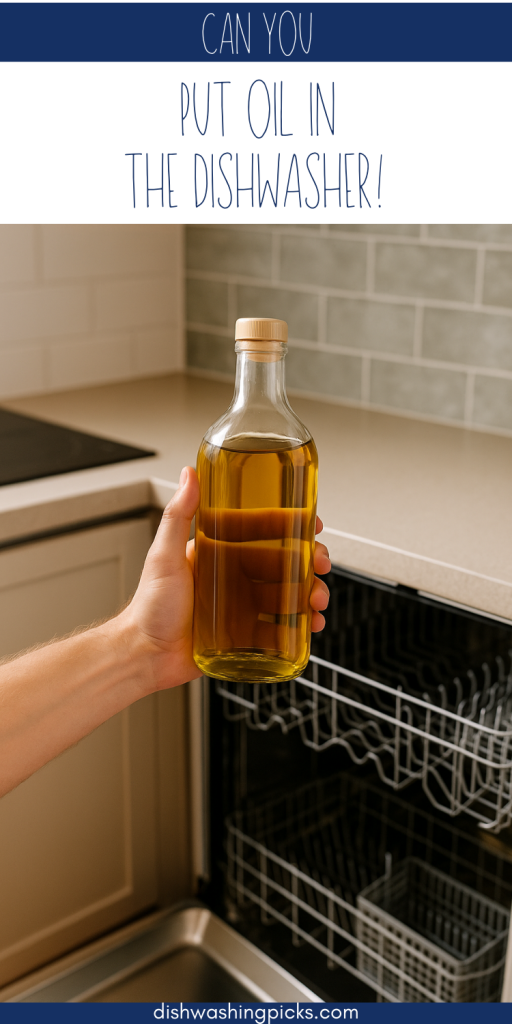
A Slippery Situation
So you’re cleaning up after a cooking session—maybe some deep-fried goodness or that big batch of olive-oil-roasted veggies. You glance at the leftover pan and think…
“Can I just toss this oily mess straight into the dishwasher?”
Seems logical, right? Let the machine do the heavy lifting. After all, dishwashers are made to tackle grime.
But wait—what happens when oil meets dishwasher?
Short answer: nothing good.
Let’s break down why pouring or putting oil into your dishwasher might not be such a hot idea… and what to do instead.
What Actually Happens When You Put Oil in the Dishwasher?
Here’s the thing: oil and water don’t mix. We all learned that somewhere between 3rd-grade science and our first failed salad dressing.
When you put oil—especially in large amounts—into a dishwasher, a few annoying things can happen:
- The oil doesn’t break down. Dishwashers use hot water and detergent to clean, but even the best soap can only do so much when oil is literally coating everything.
- It can clog up the system. Grease and oil don’t just vanish. They cling to the inside of pipes, drains, and spray arms. Over time, that gunk can build up and cause serious performance issues—or even backups.
- Your dishes won’t get clean. Instead of washing food residue away, the oil just spreads it around like a greasy film. Suddenly, your sparkling glasses come out looking foggy. Ew.
- Your dishwasher starts to smell. Yep, stale cooking oil has a unique way of hanging around and making itself known—especially when it gets reheated during the next cycle.
Bottom line? Dishwashers aren’t designed to handle straight-up oil. They can handle residue, sure—but not that half-cup you were tempted to rinse down the drain.
Can It Actually Damage the Dishwasher?
Good question. While one-time exposure to a bit of oil won’t kill your dishwasher, repeated exposure over time can:
- Clog the drain pump or filter
- Reduce cleaning efficiency
- Cause unpleasant odors
- Contribute to mechanical wear (especially when internal parts get coated and gummy)
Think of it like this: putting oil in your dishwasher is like pouring bacon grease into your bathroom sink. It might go down once or twice, but eventually, you’ll wish you hadn’t.
What Should You Do Instead?
Here’s the smarter way to handle oily dishes or cookware:
1. Wipe Before You Wash
Grab a paper towel or napkin and wipe off as much oil as possible from pans, plates, and bowls before loading them into the dishwasher. You’ll be amazed how much it helps.
2. Use Hot Soapy Water First
If something’s really greasy (like after deep frying), consider giving it a quick hand wash with hot, soapy water to cut through the worst of the oil before letting the dishwasher finish the job.
3. Clean the Filter Regularly
If you’ve dealt with oily loads recently, it’s a good idea to check and clean your dishwasher filter. It’s a gunk magnet.
4. Run a Cleaning Cycle with Vinegar or a Cleaner
Every month or so, give your machine a fresh start with a dishwasher-safe cleaner or a cup of vinegar on the top rack. It helps break down lingering grease and freshens things up.
What If You Already Put Oil in There?
Don’t panic—it’s not the end of the world.
Here’s a quick recovery plan:
- Check the filter and clean it if there’s buildup
- Run a hot cycle with vinegar to cut through residue
- Leave the door open after the cycle to air things out
- Next time? Avoid the oil altogether. Your dishwasher (and plumbing) will thank you.
TL;DR: Dishwasher ≠ Garbage Disposal for Oil
Let’s recap:
| Action | Dishwasher-Safe? | Why / Why Not |
| Scraping oily plates | ✅ Yes | Totally fine—residue is expected |
| Putting a pan full of oil | ❌ Nope | Too much oil = drain clog + poor cleaning |
| Pouring oil directly inside | ❌ Big mistake | Just… don’t do it |
| Cleaning with a vinegar rinse | ✅ Yes | Helps cut through grease naturally |
Treat Your Dishwasher Right
Dishwashers are magical—but they’re not invincible.
They can handle a little grease here and there, but if you’re regularly rinsing oil down with your dishes, you’re inviting clogs, odors, and half-clean silverware into your life.
So next time you’re about to load up that greasy tray or oily bowl?
Pause. Wipe. Then wash.
Trust me—it’s worth the extra 10 seconds.
